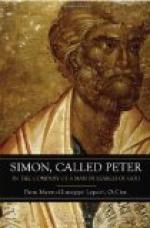He made his way to the river, and lingered there long. The great cathedral, with its bare January trees silhouetted to the last twig against the clear sky, its massive buttresses, and its cluster of smaller buildings, held his imagination. He went in, but they were beginning to sing Mass, and he soon came out. He crossed to the farther bank and found a seat and lit a pipe. Sitting there, his imagination awoke. He conceived the pageant of faith that had raised those walls. Kings and lords and knights, all the glitter and gold of the Middle Ages, had come there—and gone; Bishops and Archbishops, and even Popes, had had their day of splendour there—and gone; the humbler sort, in the peasant dress of the period, speaking quaint tongues, had brought their sorrows there and their joys—and gone; yet it seemed to him that they had not so surely gone. The great have their individual day and disappear, but the poor, in their corporate indistinguishableness remain. The multitude, petty in their trivial wants and griefs, find no historian and leave no monument. Yet, ultimately, it was because of the Christian faith in the compassion of God for such that Notre-Dame lifted her towers to the sky. The stage for the mighty doings of Kings, it was the home of the people. As he had seen them just now, creeping about the aisles, lighting little tapers, crouched in a corner, so had they always been. Kings and Bishops figured for a moment in pomp before the altar, and then monuments must be erected to their memory. But it was not so with the poor. Peter, in a glow of warmth, considered that he was in truth one of them. And Jesus had had compassion on the multitude, he remembered. The text recalled him, and he frowned to himself.
He knocked out his pipe, and set out leisurely to find luncheon. The famous book-boxes held him, and he bought a print or two. In a restaurant near the Chatelet he got dejeuner, and then, remembering Julie, bought and wrote a picture-postcard, and took a taxi for the Bois. He was driven about for an hour or more, and watched the people lured out by the sun, watched the troops of all the armies, watched an aeroplane swing high over the trees and soar off towards Versailles. He discharged his car at the Arc de Triomphe, and set about deciphering the carven pictures. Then, he walked up the great Avenue, made his way to the Place de la Republique, wandered through the gardens of the Louvre, and, as dusk fell, found himself in the Avenue de l’Opera. It was very gay. He had a bock at a little marble table, and courteously declined the invitations of a lady of considerable age painted to look young. He at first simply refused, and finally cursed into silence, a weedy, flash youth who offered to show him the sights of the city in an apparently ascending scale till he reached the final lure of a cancan, and he dined greatly at a palace of a restaurant. Then, tired, he did not know what to do.




